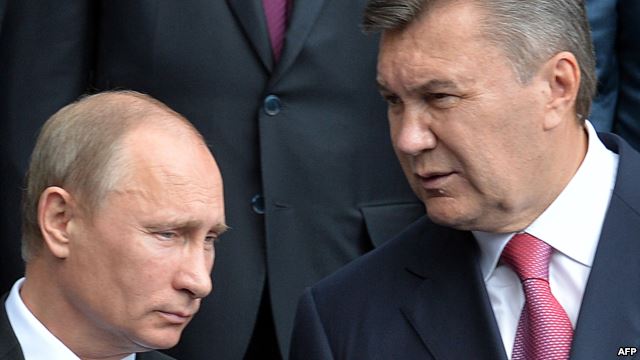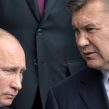
Kyiv Testing ‘Pause’ in EU Integration
Publication: Eurasia Daily Monitor Volume: 10 Issue: 205
By:

The political situation in Ukraine has been heating up as the European Union’s November 28–29 Eastern Partnership summit in Vilnius approaches. Kyiv is preparing to sign an Association Agreement (AA) with the EU at Vilnius, but it is not yet certain whether the signing will go forward. Reaching this agreement could be a blow to Russian President Vladimir Putin’s “Eurasianist” integration policy and eventually challenge the current Russian political model. Consequently, Moscow has been applying substantial economic pressure on Kyiv to turn the tide in Russia’s favor (see EDM, August 15, September 3, October 10, 16).
President Viktor Yanukovych made a hasty working visit to Moscow on November 9, which his press office pre-announced as motivated by the need to discuss “trade and economic relations with Russia on the eve of the Vilnius Summit.” Earlier on October 27, Yanukovych met with Putin in Sochi. Both visits received virtually no media coverage, which led one of Ukraine’s opposition leaders, Arseniy Yatseniuk, to sharply react on November 11: “If this is about secret negotiations with the president of another state, then this is a direct cause for impeachment […] because it is about state treason” (https://www.pravda.com.ua/news/2013/11/11/7001904/).
Apparently, during the Sochi meeting, President Putin presented his Ukrainian counterpart with some “carrots.” The director of the Institute of Ukrainian Policy, Kost Bondarenko, told Jamestown on November 11 that Putin’s proposals included a $15 billion financing program for Ukraine, reduced natural gas prices, and promises to continue cooperation on joint projects in nuclear energy and technology as well as the manufacturing sectors. Subsequently, the Russian proposal to launch “multi-billion dollar joint projects with Ukraine aimed at diversifying the country’s economy if Kyiv fails to sign an EU association agreement” were repeated by presidential advisor Sergei Glazyev (RIA Novosti, November 10). According to Bondarenko, the November 9 presidential summit in Moscow was, therefore, designed to discuss Russian-Ukrainian cooperation as well as Russian guarantees and various scenarios for the evolution of bilateral relations based on whether Kyiv does or does not sign the AA with the EU, or whether the agreement is postponed until 2014. Furthermore, Bondarenko wrote on November 12 that, apparently, in an effort to appear more accommodating, Russia has lifted its insistence on Kyiv joining the Customs Union (https://blogs.pravda.com.ua/authors/bond/528165a709e31/).
Sentiments for resolving the trade issues with Russia have been on the rise in Ukraine recently. For instance, on November 11, Ukrainian Prime Minister Mykola Azarov told the Ukrainian TV channel Inter, “It is not simply that we ‘do not want’ confrontation [with Russia], but that we will ‘never allow’ it… There will be no enmity between Russia and Ukraine, at least while our Government and our President are at the helm” (https://voiceofrussia.com/news/2013_11_11/Ukraine-doesnt-want-confrontation-with-Russia-Ukrainian-PM-8001/). Furthermore, on that same day, the heads of Ukraine’s pro-government trade union federation (FPU) and industrialists association (USPP) requested that President Yanukovych meet with them as soon as possible to discuss the worsening of trade with Russia. The USPP specifically mentioned the economic hardships of railroad car building companies caused by Russia’s refusal to certify Ukraine’s production (https://www.pravda.com.ua/news/2013/11/11/7001921/). Official statistics show that Ukraine’s railroad equipment exports fell 35 percent year-on-year in August 2013, where Russia was a key export market.
At a meeting with the USPP on November 12, parliamentary deputy Valentyn Landyk asked the president to “postpone the [EU Association Agreement] signature by one year” (https://www.president.gov.ua/en/news/29439.html). Meanwhile, President Yanukovych characterized Kyiv’s European integration efforts as “pragmatic” (https://www.president.gov.ua/en/news/29368.html).
Yet, despite such mixed signals toward signing the AA, Yanukovych’s government appears to be more steadfast in developing broader cooperation with the West, including in the security and defense spheres with the EU and the North Atlantic Treaty Organization (NATO)—much to Russia’s irritation. Ukrainian marines based in Crimea recently successfully participated in the NATO Steadfast Jazz 2013 exercise (https://www.mil.gov.ua/index.php?lang=ua&part=news&sub=read&id=31418), while the military is also preparing to participate in a multi-national Lithuanian-Polish-Ukrainian brigade (October 23, www.bns.ee) as well as the proposed Visegrad Four + Ukraine EU Battlegroup. Kyiv has also been proactive in easing energy dependence from Russia and tries to seek US and Chinese financial support to address Ukraine’s fiscal deficit (see EDM, July 30, 2012; January 28, November 8, 2013).
There seems to be little such pragmatism from the Russian side, however. In fact, Kremlin advisor Glazyev challenged European liberal values as running counter to the Russian elite’s “[Christian] Orthodoxy” and characterized the Ukrainian leaders’ European choice as “in essence, anti-Christian” (https://obozrevatel.com/interview/50384-glazev-rar-i-tsarev-za-zavtrakom-s-berezovskoj.htm). Moscow clearly would like Ukraine to abandon its role as a “political transit state” and finally choose between East and West. The Russian ambassador to the EU, Vladimir Chizov, told the Russian International Affairs Council on November 12: “Both Moscow and Brussels are sending a certain signal not only to Kyiv, but also to some other so-called focus states of the Eastern Partnership, so that, in practical terms, the time of comfortably sitting between the two chairs is coming to an end” (https://russiancouncil.ru/en/inner/?id_4=2671#top).
Nevertheless, the main formal obstacle preventing the European Union from agreeing to sign the Association Agreement with Ukraine remains President Yanukovych’s unwillingness to release from prison the former prime minister and opposition leader Yulia Tymoshenko. The government needs to release Tymoshenko to demonstrate to Brussels that Ukraine is effectively addressing the issue of “selective justice” (see EDM, November 12). Yesterday (November 13), the Ukrainian parliament failed to pass a bill to allow Tymoshenko to leave prison for medical treatment in Germany (RFE/RL, November 13). The Ukrainian authorities likely reason that while the benefits stemming from signing the AA will appear only in the long term, a shrewd politician like Yulia Tymoshenko might use Ukraine’s current economic downturn and Russian pressure on Kyiv as campaign issues with which to attack Yanukovych in the upcoming spring 2015 presidential elections. This line of argument, however, rests on the assumptions that Vladimir Putin’s promises and threats are credible, and that the West’s policy on Ukraine is immutable. In fact, the EU might still consider lifting its “red line” on Tymoshenko and instead pledge to support Ukraine and sign the Association Agreement at the Vilnius Summit—while at the same time applying conditionality to Ukraine’s further development and democratization efforts. But the continuing lack of consensus among EU member states, coupled with the Ukrainian authorities’ record of insufficient cooperation in Tymoshenko’s case, somewhat tamper the likelihood of such an outcome. Nonetheless, for now, the prospects that the Ukraine-EU Association Agreement will be signed at the end of the month still remain relatively high.




